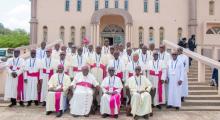Issued by the Catholic Center for Studies and Media - Jordan. Editor-in-chief Fr. Rif'at Bader - موقع أبونا abouna.org

Is Latin more effective than vernacular languages in driving out demons? An exorcist answers this controversial question.
Interviewed by ACI Prensa, CNA’s Spanish-language sister news agency, Father Francisco Torres Ruiz, a priest of the Diocese of Plasencia in Spain who is in charge of the ministry of exorcism, said that many people wonder “if it’s better to use the exorcism ritual of 1614, reformed by Pope Pius XII in 1952; [they wonder] if it’s better and more effective than the ritual promulgated by St. John Paul II in the year 2000.”
“In the first place,” said the priest, who is also a liturgy professor, it’s important “to establish a theological principle: Exorcism is a sacramental celebration of the Church and, therefore, receives its efficacy from the prayer and faith of the Church.”
This, he stressed, “is one of the differences between sacraments and sacramentals.”
“The sacraments are outward signs that communicate grace, that are effective by themselves, because their effectiveness comes from Jesus Christ himself, who is the one who instituted them, and they are neither more nor less than seven, as the Council of Trent said,” the priest explained.
“The sacramentals for their part are visible signs, structured in imitation, in a certain resemblance, to the sacraments, insofar as they are words and signs, but which have been instituted by the Church and their effectiveness is not ex opere operato, as for example a sacrament, rather it is ex opere operantis — that is, by the faith and prayer of the Church, which is pledged in them and engaged in these actions,” he said.
Torres said that “an exorcism is a simple thing; it’s a liturgical celebration of the Church in which the apotropaic action of Jesus Christ is invoked.”
“What does this somewhat strange word mean? Apotropaic means ‘battle,’ ‘defense,’ [or]’ combat,’” he noted.
“That is to say, it is Jesus Christ who confronts Satan, the rebellious spirits, in an exorcism while in that same ritual the victory of Jesus Christ over sin and death, over the devil, is proclaimed,” he said.
The Spanish priest also said that in an exorcism “there are two types of prayers that are done, facing the devil directly.”
“The first is what we call the prayer of supplication, which invokes divine help, the one that asks God to free the person, to protect the person who is being harassed, who is being mistreated by the devil,” he pointed out.
The second, he continued, is “a prayer of command, which is the prayer that only the priest authorized by his bishop directs straight at Satan, or against the demons that are there, exhorting them, adjuring them, commanding them, ordering them, threatening them so that they depart from the person they have subjugated.”
In this way, the devil “is commanded, ordered, above all by proclaiming that victory of Jesus Christ, that battle of Jesus Christ against them, and also reminding them at times of the pain of hell, the punishments to which they are doomed from the creation of the world by their rebellion.”
The Spanish exorcist stressed that “the ritual of 1614 is neither better nor more effective, nor is the ritual of 2000 better or more effective.”
“It’s true that the one from 1614 brought together a tradition that dates back at least to the 12th century of the most effective or most widespread prayers among exorcists in the Middle Ages for the fight against the devil,” he noted.
In the exorcism ritual of 2000, “the threats to the devil, the insults to the devil, have been suppressed, for example, because there were ritual prayers from 1614 that were directly a torrent of insults against the devil.”
“That is, they wanted to remove that part, let’s say, more threatening to the devil, to accentuate the kerygmatic proclamation of the Paschal Mystery of Jesus Christ,” he said.
Torres explained that “if an exorcist uses the ritual of 1614, he is acting correctly and it is effective, and if an exorcist uses the one from the year 2000, he is acting efficaciously and correctly, because the Church has pledged her prayer and her faith in those rituals.”







